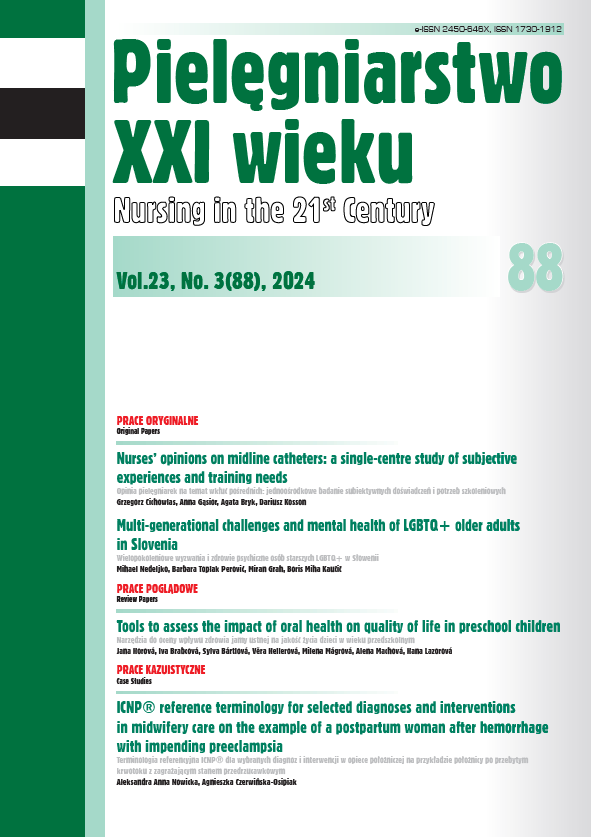Perception of sleep during hospitalisation from the nurses’ and patients’ perspective: an exploratory qualitative study
DOI:
https://doi.org/10.2478/pielxxiw-2024-0031Keywords:
sleep, hospital, patients, nurses, thematic analysisAbstract
PERCEPTION OF SLEEP DURING HOSPITALISATION FROM THE NURSES’ AND PATIENTS’ PERSPECTIVE: AN EXPLORATORY QUALITATIVE STUDY
Aim. To investigate how nurses and patients perceive sleep and point out the factors that negatively impact patients’ sleep during hospitalisation in selected departments in two hospitals in the Czech Republic.
Material and methods. An exploratory qualitative study – thematic analysis. We obtained data from three group interviews involving 16 nurses and eight inpatients from selected departments in two hospitals. We conducted an exploratory qualitative study and thematic analysis.
Results. The thematic analysis identifi ed four main themes. Theme (1): Importance of sleep. Theme (2): Quality and organisation of nursing care. Theme (3): Experiencing intense emotions and feelings. Theme (4): Health.
Conclusions. Hospitalisation often negatively aff ects patients’ sleep. Patients’ emotions, experiences, and the hospital environment are essential to achieve good sleep. Nurses and the entire health care system have great potential to improve hospitalisation conditions concerning sleep and the emotional mood of patients and thus indirectly infl uence the general health of patients and their recovery.
References
1. Riemann D, Krone LB, Wulff K, et al. Sleep, insomnia, and depression. Neuropsychopharmacol. 2020; 45(1): 74-89. https://doi.org/10.1038/s41386-019-0411-y.
2. Wesselius HM, van den Ende ES, Alsma J, et al. Quality and Quantity of Sleep and Factors Associated With Sleep Disturbance in Hospitalized Patients. JAMA Intern. Med. 2018;178(9): 1201-1208. https://doi.org/10.1001/jamainternmed.2018.2669.
3. Pires GN, Bezerra AG, Tufik S, et al. Effects of acute sleep deprivation on state anxiety levels: a systematic review and meta-analysis. SLEEP Med. 2016; 23: 109-118. https://doi. org/10.1016/j.sleep.2016.07.019.
4. Killgore WDS. Effects of sleep deprivation on cognition. Prog. Brain. Res. 2010; 185: 105-129. https://doi.org/10.1016/B978-0-444-53702-7.00007-5.
5. Rault C, Sangaré A, Diaz V, et al. Impact of Sleep Deprivation on Respiratory Motor Output and Endurance. A Physiological Study. Am. J. Respir. Crit. Care. Med. 2020; 201(8): 976-983. https://doi.org/10.1164/rccm.201904-0819OC.
6. Shanshan Wang, Zhexi Li, Xiaoyu Wang, et al. Associations between sleep duration and cardiovascular diseases: A meta-review and meta-analysis of observational and Mendelian randomization studies. Front. Cardiovasc Med. 2022;9. https://doi.org/10.3389/fcvm.2022.930000.
7. Campanini MZ, Mesas AE, Carnicero-Carreño JA, R, et al. Duration and Quality of Sleep and Risk of Physical Function Impairment and Disability in Older Adults: Results from the ENRICA and ELSA Cohorts. Aging Dis. 2019; 10(3): 557-569. https://doi.org/10.14336/AD.2018.0611.
8. Irwin MR, Olmstead R, Carroll JE. Sleep Disturbance, Sleep Duration, and Inflammation: A Systematic Review and Meta-Analysis of Cohort Studies and Experimental Sleep Deprivation. Biol. Psychiatry. 2016; (1). https://doi.org/10.1016/j.biopsych.2015.05.014.
9. Nelson KL, Davis JE, Corbett CF. Sleep quality: An evolutionary concept analysis. Nurs. Forum. 2022; 57(1): 144-151. https://doi.org/10.1111/nuf.12659.
10. Honarmand K, Rafay H, Le J, et al. A Systematic Review of Risk Factors for Sleep Disruption in Critically Ill Adults. Crit. Care Med. 2020; 48(7): 1066-1074. https://doi.org/10.1097/CCM.0000000000004405.
11. Gellerstedt L, Medin J, Karlsson MR. Patients’ experiences of sleep in hospital: a qualitative interview study. J. Res. Nurs. 2014; 19(3): 176-188.
12. Gellerstedt L, Medin J, Kumlin M, et al. Nurses’ experiences of hospitalised patients’ sleep in Sweden: a qualitative study. J. Clin. Nurs. 2015; 24(23-24): 3664-3673. https://doi.org/10.1111/jocn.12985.
13. Lewandowska K, Mędrzycka-Dąbrowska W, Pilch D, et al. Sleep Deprivation from the Perspective of a Patient Hospitalized in the Intensive Care Unit-Qualitative Study. Healthc. Basel. Switz. 2020; 8(3). https://doi.org/10.3390/healthcare8030351.
14. Tembo AC, Parker V, Higgins I. The experience of sleep deprivation in intensive care patients: Findings from a larger hermeneutic phenomenological study. Intensive Crit. Care 2013; 29(6): 310-316. https://doi.org/10.1016/j.iccn.2013.05.003.
15. Braun V, Clarke V. Using thematic analysis in psychology. Qual. Res. Psychol. 2006; 3(2): 77-101. https://doi.org/10.1191/1478088706qp063oa.
16. Zarzycka D, Gesek M. The factors affecting the critical thinking skills among nursing students – an integrative literature review. Pielegniarstwo XXI Wieku. 2022; 21(3): 174-180. https://doi.org/10.2478/pielxxiw-2022-0021.
17. Gellerstedt L, Medin J, Kumlin M, et al. Sleep as a topic in nursing education programs? A mixed method study of syllabuses and nursing students’ perceptions. Nurse Educ. Today. 2019; 79: 168-174. https://doi.org/10.1016/j.nedt.2019.05.030.
18. McIntosh AE, MacMillan M. The knowledge and educational experiences of student nurses regarding sleep promotion in hospitals. Nurse Educ. Today. 2009; 29(7): 796-800. https://doi.org/10.1016/j.nedt.2009.03.006.
19. Berglund B, Lindvall T, Schwela DH. Occupational WHO, Team EH. Guidelines for community noise. World Health Organization; 1999.
20. Darbyshire JL, Young JD. An investigation of sound levels on intensive care units with reference to the WHO guidelines. Crit. Care. 2013; 17(5): R187. https://doi.org/10.1186/cc12870.
21. de Lima Andrade E, da Cunha e Silva DC, de Lima EA, et al. Environmental noise in hospitals: a systematic review. Environ. Sci. Pollut. Res. Int. 2021; 28(16):1 9629-1942. https://doi.org/10.1007/s11356-021-13211-2.
22. Le A, Friese RS, Hsu CH, et al. Sleep disruptions and nocturnal nursing interactions in the intensive care unit. J. Surg. Res. 2012; 177(2): 310-314. https://doi.org/10.1016/j.jss.2012.05.038.
23. Ritmala-Castren M, Salanterä S, Holm A, et al. Sleep improvement intervention and its effect on patients’ sleep on the ward. J. Clin. Nurs. 2022; 31(1-2): 275-82. https://doi.org/10.1111/jocn.15906.
Downloads
Published
Issue
Section
License
Copyright (c) 2024 Authors

This work is licensed under a Creative Commons Attribution 4.0 International License.




